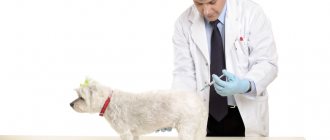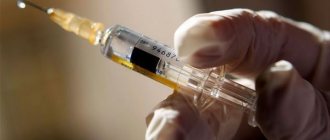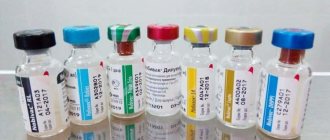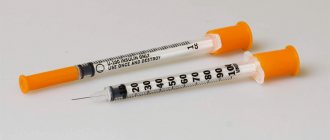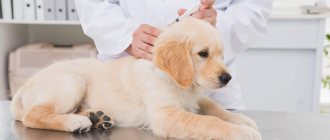Rabies vaccination for animals
must be carried out. According to the law, animals that have reached three months of age must be vaccinated against this viral disease. In nature, the main carriers of the disease are foxes, raccoons, raccoon dogs, wolves and rats.
Rabies is incurable in animals and humans and leads to 100% death of those affected. Infection occurs when a sick animal is bitten or its saliva gets on injured areas of the skin or mucous membranes. Only timely vaccination can prevent the occurrence of rabies in cats and dogs, even when they have had contact with a carrier of the disease. By law, the owner is required to vaccinate his pet annually. In its absence, you will need to pay a fine. The animal can also be quarantined if there are doubts about its health. In exceptional cases, it is possible to kill it and send brain tissue for laboratory tests to detect rabies.
In the absence of vaccination, cats and dogs are not allowed for exhibitions, breeding and transportation in public transport.
When asked whether you should get a rabies vaccination
, there is only one answer - necessary.
Contraindications to rabies vaccination
Temporary contraindications to rabies immunization are:
- animal pregnancy;
- feeding offspring;
- age less than 2 months;
- recovery period after illness.
In other cases, there are no restrictions on the procedure.
Vaccination of cats against rabies
Cats are vaccinated annually. Complex vaccines are used for it, which allow you to simultaneously protect the animal not only from rabies, but also from a number of major diseases; or monovaccines, only against this virus. The second option is preferable for older animals who should not overload their body.
The vaccination is given only to a completely healthy cat, which has been treated for worms and fleas 2 weeks before the administration of the drug. Depending on the type of vaccine, it is administered subcutaneously or intramuscularly. If a vaccination is chosen using vaccines from different manufacturers, then the injections are given in different places so that the drugs do not overlap. Some manufacturers make it possible to combine the rabies vaccine they produce with one that will protect the animal from major diseases. In this case, the rabies composition acts as a diluent for the second component of the vaccine. Most often, Nobivak formulations are used in this way.
Revaccination should be carried out annually. An exception is Nobivac Rabies serum, which provides immunization for a period of 3 years. However, if it is necessary to obtain documents from state veterinary services, they will not look at this and will require revaccination annually.
In addition to Nobivak vaccines, the following products are also used:
- Rabikan,
- Quadricate,
- Felovax.
Imported vaccines are more easily tolerated by animals than Russian ones.
Do dogs need vaccinations?
Many dog owners are quite careless about vaccinating their pets against rabies, hoping that their pet, with whom they walk around the house, will not become infected. However, a dog can be attacked by a sick animal even on seemingly safe city streets. After being bitten by a sick cat or city bat, your pet could easily end up on a waiting list for euthanization. There is currently no effective treatment for rabies.
Your pet will definitely need vaccinations if:
- planning for crossing the country's border;
- to participate in exhibitions;
- if the animal is breeding;
- if you need to leave the dog for foster care;
- if you live in a rabies-prone area.
Vaccination of dogs against rabies
According to the law, a dog must be vaccinated against rabies annually starting from the age of three months, i.e. still a puppy. Vaccination of a puppy begins only after examination by a veterinarian and then only under his direct supervision. Information about vaccination is entered into the animal’s veterinary passport and is confirmation that the animal is protected from the disease and cannot be its carrier.
More often, rabies is vaccinated in combination with other major diseases. It is especially important to accurately monitor compliance with the vaccination schedule for hunting dog breeds that are used strictly for their intended purpose and regularly come into contact with wild animals. They have a much higher risk of contracting rabies than other pets.
When a vaccine is administered, there is no risk that diseases will begin to develop, but at the same time, stable immunity is formed. The risk that a vaccinated dog will develop rabies is less than 1%. This phenomenon can only be observed if the vaccination was carried out with a low-quality vaccine, or if the pet was sick at the time of the injection.
Rabies vaccination for a dog
injected subcutaneously in the withers area. Certain types of vaccine can be given intramuscularly in the thigh. Animals tolerate immunization against rabies easily, only in rare cases there is a deterioration in health that lasts 2-3 days. A complication may also be the appearance of a lump under the skin, which resolves within 10-30 days. It may appear due to the individual reaction of the animal’s body or due to too rapid administration of the drug.
Rules for vaccination and revaccination
Vaccination is a very important event, before which your pet needs to be carefully prepared and its health status checked.
It is important to check that on the day of vaccination the kitten is:
- active and cheerful;
- body temperature did not exceed 38-39°C;
- there was no discharge from the eyes, nose, as well as sneezing and coughing;
- the animal ate well.
Before vaccination, communication with other cats that show signs of illness is strictly prohibited.
It is also important to remember that only pets over 2 months of age are eligible for vaccination.
10 days before the vaccine is administered, fleas and ticks on the animal’s fur and body should be treated. This can be done using special drops or collars.
They also carry out deworming, ridding the pet of possible infection with worms. It is better if this procedure is carried out twice with a break of 10 days.
It is not recommended to vaccinate within 3 weeks after surgery, if any. When treated with antibiotics, the medical tap is effective for 2 weeks. After this period, if all health indicators are present, the animal is vaccinated.
If the pet was picked up from the street, you need to undergo the necessary tests that will show the presence or absence of antibodies to certain types of diseases in the blood. It is strictly forbidden to re-vaccinate an animal.
The owner of a pet should obtain a veterinary passport, which will record the vaccination schedule, medications that were used and all health indicators of the pet.
To carry out vaccination, you need to choose an experienced doctor who will not allow violations during the procedure. Otherwise, complications or unwanted side effects may develop.
It is also better to entrust the choice of vaccine to a professional. However, you should adhere to the general rules for selecting medications:
- for a young kitten it is better to choose imported vaccines, since their effect on the body is milder;
- Vaccination is administered strictly in accordance with the instructions;
- You must first make sure that the expiration date of the substance is in accordance with the expiration date; it is unacceptable to use expired medicine.
For half an hour after administration, you need to sit within the walls of the veterinary clinic, observing the cat. At this time, an allergic reaction may develop. Therefore, it is better to be closer to the doctor at this moment.
What infections are dogs vaccinated against?
Canine distemper, canine distemper
It has intestinal, pulmonary, nervous and cutaneous forms of the disease. Due to such a variety of systems and organs affected, symptoms may vary, making diagnosis difficult. General symptoms are extremely nonspecific - lethargy, fever, poor appetite. The virus is transmitted not only from dog to dog, but also through objects and premises. Mortality depends on age, form of the disease and even the breed of the dog, so it varies in different groups from 30 to 100%.
Parvovirus enteritis
It is most often transmitted through the feces of infected dogs. It has two forms - cardiac and intestinal. The cardiac form is more dangerous, but the intestinal form is more common. Characteristic symptoms are fever, painful abdomen, vomiting, severe diarrhea with traces of blood. The intestinal form of parvovirus affects the small intestine, leading to severe dehydration, which can result in the death of the animal. Puppies are especially susceptible to the disease, the mortality rate among them is over 50%.
Adenovirus in dogs
Type 1 adenovirus causes viral hepatitis in dogs. The disease affects the liver and lymphatic system. It can be either acute or chronic. Symptoms: painful stomach, enlarged liver, diarrhea, dark urine. With a hyperacute course of the disease, mortality is 90-100%. Adenovirus of the second type affects the respiratory tract, accompanied by a severe dry cough, wheezing in the lungs, complications also often lead to death.
Leptospirosis
The causative agent is a dangerous spirochete bacterium. It can be found not only in the secretions of sick animals, but even simply in stagnant warm bodies of water in the summer. Causes the development of jaundice and severe intoxication of the body. The mortality rate among dogs is over 65%. Leptospirosis can be transmitted to different pets from each other, and it can also be transmitted from animals to humans. The disease does not spread from person to person.
Canine parainfluenza
Easily transmitted by airborne droplets, cases of infection are common during the cold season. This is a respiratory disease that affects the airways. Parainfluenza is treatable, but is dangerous due to complications – pneumonia, pneumonia. At risk are puppies and dogs kept in group kennels and shelters.
Rabies
The disease is common to humans and animals.
The rabies virus causes serious damage to the central nervous system, leading to hallucinations, aggression, paralysis and death. Most often, rabid animals are euthanized without any attempt at treatment. A rabid dog poses a huge threat to everyone around it. Some of these diseases are treatable if diagnosed early. However, there are atypical forms of infection when the disease is asymptomatic, quietly leading to the death of the pet.
Why is it necessary to vaccinate dogs?
- Most dogs are not exclusively apartment pets; they go for walks, go on hikes, or live outside the city. In such conditions, it is easy to encounter pathogens of dangerous diseases in the environment, infected and recovered animals that are carriers of infections.
- Timely vaccination of a pet is obviously easier and cheaper than treatment and quarantine in case of infection. The cost of one vaccination is many times lower than the cost of serums, tablets, vitamins, and special diets. Which, moreover, do not guarantee recovery.
- By vaccinating their dogs, owners contribute to stabilizing the epidemiological situation in the region. It is necessary to strive for universal vaccination of dogs in Moscow and throughout Russia.
- Vaccinations are required to obtain a veterinary passport. Dog owners love to travel with their pets. A veterinary passport is the main document for a dog on a trip.
- By law, all dog owners must have their pet vaccinated against rabies, otherwise penalties may be imposed. If a rabid animal bites a person, the owner will face criminal liability.
Complications after vaccinations in dogs.
Serious complications occur only with the use of untested vaccines or with self-vaccination by non-professionals. Basically, this is the development of the disease against which the vaccine was given.
An allergic reaction to certain components of the drug is possible. When vaccinating in a clinic, a specialist will select effective antihistamines for this case. A slight deterioration in health - lethargy, drowsiness, a one-time refusal to eat after vaccination - are normal, pass quickly and are not dangerous symptoms.
How to prepare your dog for vaccination?
Vaccination is the most common procedure in veterinary practice. You don’t need to prepare for it for a long time, but you should take some precautions.
- Before vaccinating your animal, make sure it is not already infected. If you receive a puppy of unknown origin, vaccinate it only after quarantine.
- Two weeks before vaccination, the dog must be treated for parasites.
- You should refuse vaccination if the animal is stressed, overexerted, or if its health has clearly deteriorated for some reason.
- If possible, do not change anything in your dog's routine before visiting your veterinarian. This will avoid unnecessary worry and keep your pet in good physical and mental condition.
Dog vaccination schedule.
Puppies up to eight weeks have immunity acquired from their mother along with her milk. Therefore, puppies need to be vaccinated starting from 10-12 weeks.
When using modern polyvalent vaccines, the first vaccination is given against distemper, adenovirus, parvovirus, parainfluenza and leptospirosis, but without rabies; after 21-28 days the vaccination is repeated, but together with the anti-rabies vaccine. This is how reliable immunity against these infections is formed. Vaccination must be repeated after a year. Adult but unvaccinated dogs can begin to be vaccinated according to the same scheme.
What drugs do we use to vaccinate dogs at Vetlife?
These are polyvalent vaccines and rabies vaccines produced in the USA, France and the Netherlands. Polyvalent vaccines are designed to create immunity against several infections simultaneously and are very convenient and effective.
All drugs used in our clinic are approved for use by Rosselkhoznadzor. The list of drugs used for vaccination in our clinic is published in the price list. The cost of vaccinating a dog depends mainly on the drugs used and can range from 1210 to 1320 rubles.
If you still have questions about vaccination or need help selecting a drug, you can make an appointment with a veterinarian from the clinic administrator.
Go to price list
What is rabies in dogs?
Rabies is a virus that is widespread throughout the world. Despite decisive and aggressive preventive measures, cases of rabies infection (including in humans) are recorded annually.
What is rabies in dogs? This is an incurable disease that is transmitted through saliva or blood from a carrier to a healthy animal or person. As the virus multiplies, it affects the spinal cord and brain, which leads to disruption of the central nervous system.
Usually, infection occurs through a bite. After the first symptoms of rabies appear, the infected animal is doomed to death and must therefore be euthanized.
Validity period and frequency of revaccination
Puppies are vaccinated against rabies again only 12-13 months after the first injection. If you vaccinate a puppy before this time, the body may respond with a non-standard reaction.
The duration of validity and frequency of revaccination depends on the type of vaccine, manufacturer, age of the animal, and the situation in the region.
After the administration of “Rabican”, the animal’s body is protected for 12 months with a single injection, and with a double dose – for 24-26 months.
"Rabizin" forms specific immunity for a period of 33-38 months, so revaccination is carried out every three years.
Hunting breeds, free-ranging animals, as well as dogs living in regions unfavorable for rabies are vaccinated against this infection annually. As a rule, vaccination is carried out in the spring or autumn.




